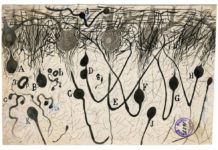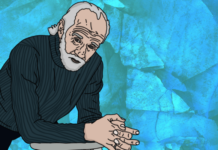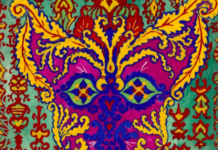“Can Madness Save the World?”
Writing for CounterPunch, Paris Williams writes that when an individual is experiencing what has been termed “psychosis,” it is important to recognize that this may also be the manifestation of a breakdown in their larger social groups, the family, society, and even the species.
Colleges Get Proactive in Addressing Depression on Campus
From The New York Times: The number of college students with mental health concerns is rapidly increasing, straining many universities' mental health and counseling centers. Colleges...
Creatively Managing Voice-Hearing Through Spiritual Writing
I am a psychiatric survivor of over thirty-six years. Since my nervous breakdown in 1978, I have undergone multitudinous experiences ranging from the subtly humiliating to the horrifically debilitating at the hands of incompetent psychiatrists and psychopharmacologists who, in the name of medicine, did more harm than good.
Using Paint, Pen on Paper or Song to Revisit Trauma
From The Conversation: The literary, visual, and performing arts can play an important role in helping people process trauma, especially for those who have difficulty...
“Group Drumming Bangs Away at Anxiety and Depression”
“Prozac? Actually, percussion.” Researchers in the UK found that a ten-week drumming intervention significantly improved anxiety and depression for people seeking mental health treatment....
Sunday FM: Music Therapy Comes to Life in Documentary
A new documentary coming to theatres around the US over the next few months explores Dan Cohen's Music and Memory program and its emotional...
A Glimpse Into the Brain, Drawn by the Father of Neuroscience
From The New York Times: A new exhibit at the Grey Gallery at New York University presents 80 hand-drawn renderings of the brain by Santiago...
“’Yalom’s Cure’ is a Meditative Immersion into Leading a Psychologist’s Life”
The LA Times reviews a new film about Irvin David Yalom, existential psychologist, emeritus professor of psychiatry at Stanford Unversity. "’Yalom's Cure’ dispenses an...
Karen Pence Picks a Cause, and Art Therapists Feel Angst
From the New York Times: On Inauguration Day, Karen Pence announced her support for the mental health profession of art therapy. While many art therapists...
Hopeless But Not Broken: From George Carlin to Protest Music
From CounterPunch: Although people are often pathologized and shamed for feeling hopeless, hopelessness is sometimes a natural reaction to an oppressive political climate. George Carlin...
“ADHD Brains are the Most Creative”
In AlterNet, Scott Barry Kaufman reviews the evidence that people who've been diagnosed with ADHD often have higher than average levels of creativity. He...
The Enduring Myth of the Mad Genius
From Wellcome Collection: It has long been assumed that great writers and artists must be touched by madness. However, no link between artistic talent and...
The Therapist who Saved my Life
In this creative nonfiction piece for Literary Hub, one woman shares her story of trauma, depression, and suicidality, and recounts the unconventional approach of the...
“Medication and Female Moods”
Listen: NPR’s On Point with Tom Ashbrook discusses the new book “Moody Bitches: The Truth About the Drugs You’re Taking, The Sleep You’re Missing, the Sex You’re Not Having and What’s Really Making You Crazy,” by the psychiatrist Julie Holland.
Mental Health Digest February 2017
A new issue of the Mental Health Digest newsletter is now available. This issue includes an overview of art therapy as well as information about the impact...
Creativity and Feelings of Madness Closely Linked in Most People
In his Scientific American blog, Scott Barry Kaufman discusses a study that provides new perspectives on the controversial question of the links between "mental...
Mad Economy: Let’s Change the World!
Everyone in the world is either touched by their own mental health issues or have had a family member affected. What if they directed their buying power to an organization that would use the profits to fund exciting mental health & recovery projects both in the developing world and in their own countries; projects that would be ethical, non-coercive, personal recovery-based, and were aimed at creating recovery communities? What if they could buy products, crafts, services, art, music, books from people who had experienced mental health issues, enabling them to set up their own businesses or buy from social co-operatives that enabled distressed people to work and earn a living wage?
Why “Stabilizing” People is Entirely the Wrong Idea
If human beings were meant to be entirely stable entities, then “stabilizing” them would be an entirely good thing; a target for mental health treatment that all could agree on. But it’s way more complex than that: healthy humans are constantly moving and changing. They have a complex mix of stability and instability that is hard to pin down. All this relates to one of my favorite subjects, the intersection of creativity and madness.
Mental Well-Being and Engagement in the Arts
Public health researchers at the University of Western Australia examined the relationship between recreational arts engagement and mental well-being in the general population. The results, which have implications for policy makers as well as health practitioners, indicate that those who engage with the arts for two or more hours per week have significantly better mental well-being.

















